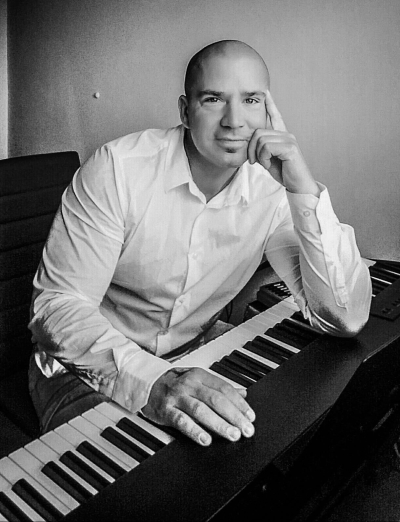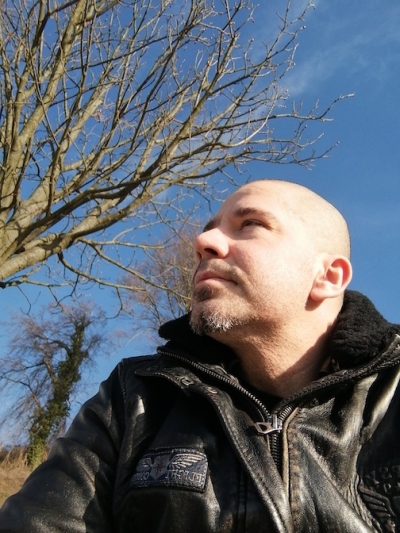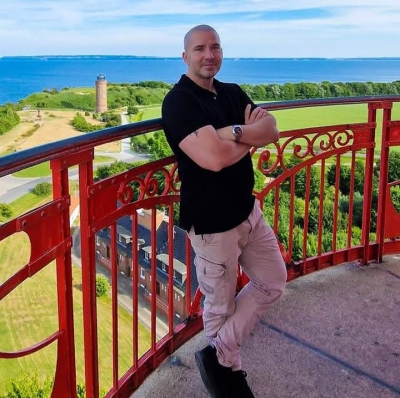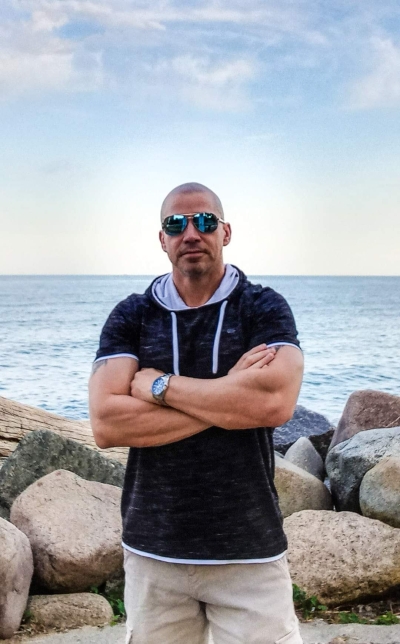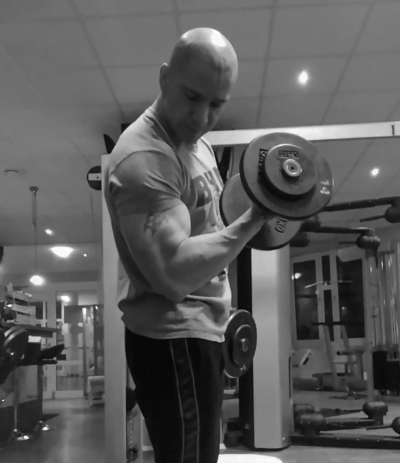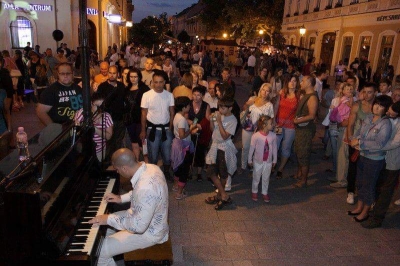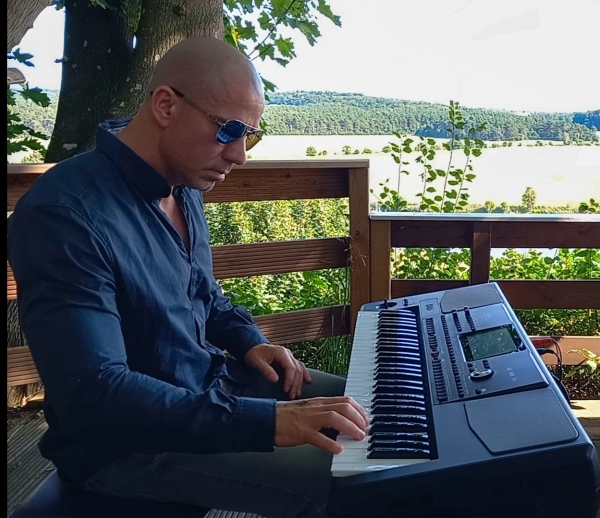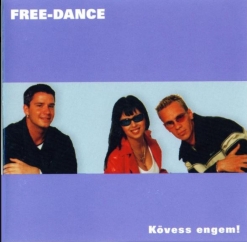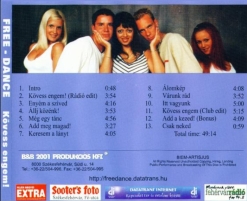Earlier this year, Dan Chadburn and Tom Nichols introduced me to the music of Zsolt Pataki, a composer/pianist who grew up in Hungary and is now living on an island in the northern part of Germany. I loved and reviewed his first album,
Safe In the Storm, as well as the three singles he has released so far. Zsolt has also posted many videos on YouTube and Facebook, so I thought it would be fun to do an interview and introduce him to a bigger audience. Enjoy!
KP: Hi Zsolt! How are you?
ZP: Hi Kathy! Thank you, I'm fine. I've been excited ever since you asked me about doing an interview. I have read many interviews on MainlyPiano.com that you have done and I am very honored that now mine will be among them and anyone in the world can read it. This is awesome!
KP: I'm so glad you've been enjoying the interviews! They are fun to do and a great way to get to know artists better! I've been looking forward to this one, too!
So far this year, you have released one full album, Safe In the Storm, and three singles! You have said that you are also working on your second album. Do you have a planned release date?
ZP: That's right. The new album will be released this December, but I don't know the exact date yet - preferably around Christmas.
KP: Will it be all new material or will some of the singles be included?
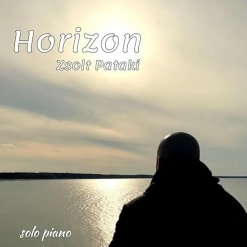
Click on album covers to
go to Kathy's reviews.
ZP: I know it's pretty unusual for a solo pianist to have two full-length albums and three singles released in the same year (2024), but I didn't release any piano music between 2017 and 2024 and I had collected enough material to cover two or even three albums. Maybe I waited too long, but maybe it had to happen this way because there were older pieces that I took out again and reworked a bit, and it seems that they are now in their final, publishable versions. It will be quite a mixed and interesting album because, in addition to the "older" pieces, it will feature two of my three singles: "Passing" and "Grateful." The very first piano piece I ever wrote (in 2017), "Summertime Memories," will be on the album, too. I am very curious to see how the listening public receives it.
KP: I'm really looking forward to it!
You also became a Whisperings Artist this year. Congratulations on that! How many of your songs are being played on the broadcast?
ZP: Thank you so much, Kathy! I have been listening to Whisperings Solo Piano Radio on a daily basis for years, but I never dreamed that one day I would also hear my own music there. Nine songs from my album were selected for the broadcast, and they can be heard on the program almost every day. I still can't believe it actually happened! The fact that I am the first Hungarian pianist-composer who has been included is a huge honor for me. I must mention that Joe Bongiorno selflessly offered me his help and sent my album to Whisperings Radio so that my music would have a better chance of being included. I am very grateful to Joe for this!
KP: Joe is a really great guy! We've been friends for a long time! I understand that Whisperings had something to do with your getting back to composing music for the piano. Tell us about that.
ZP: It was discovering the "Piano Haven" and "Whisperings All Stars" concert series in 2017 that inspired me to start composing piano music. I really liked the concept that the performing pianists told stories that were connected in some way to the pieces they were playing. When I first heard Joe Bongiorno, Michael Martinez, David Nevue and Christine Brown play, the unique and special atmosphere that surrounded these concerts captivated me and from then on, only composing piano music interested me. I felt that this is what I've always been looking for and it's where I can truly fulfill myself musically since the melodies I compose can also tell stories about different stages of my life. A few days after watching the concert, I wrote my first piano piece, "Summertime Memories."
KP: You and your music were introduced to me by Dan Chadburn and Tom Nichols, a couple of very good friends of mine. How did you meet or connect with them?
ZP: Of course, I met Dan Chadburn through the language of music. I really like Dan's music and piano playing. If I remember correctly, I once told him this in a comment on one of his videos. Later, Dan told me that he had also heard/seen some of my music and videos and that he really liked them. This was very surprising to me and naturally filled me with pride. It was a fantastic feeling to know that my music is being heard in America, and he is one of my favorite Whisperings pianists. After my solo album came out in March, Dan immediately wrote to me, partly to congratulate me on my first album and partly to ask if I knew Kathy Parsons (you!) and MainlyPiano.com. He said he would like to introduce me and my music to you and maybe you would write a review of my album. Your review was published in April this year, thank you! Unfortunately, it has been my experience that where I live, musicians hardly ever help each other, so I was very surprised and pleased that Dan and Thomas, without knowing me personally, but only through the love of my music, were so helpful to me from thousands of miles away. It feels very good to know that there are still such helpful, selfless people in the world. This helpfulness can be said about you as well, Kathy. I'm glad to meet such great people through music. By the way, Dan and Thomas were visiting here in Germany at the beginning of October for the Oktoberfest, but it's down in the south, and I live up in north, so I didn't have the chance to meet them. I hope to get to know them in person sometime.
KP: Two nicer guys you will never meet! They have performed house concerts here many times and donated the proceeds to our local Humane Society. I call them my brothers and love them both dearly!
Are you a full-time musician now?
ZP: Unfortunately, no. I still have to work hard outside of music. To be honest, this dilemma has followed me since started making music. I've always had to do various jobs that I didn't like and wasn't at all interested in. I only did them for the money because I had to live on something. Except when I worked at the Theater - that was probably the best job I've had. But let's come back to that in a bit more detail later.
When I was a child in school, I kept daydreaming about music and fame. Because of this, I was often unable to pay enough attention in class, which eventually led to the deterioration of my academic results. My mother was often called to school because I was not paying attention in class - apparently my thoughts were always somewhere else. This was probably nothing new to my mother! In addition, three of my classmates and I started a rap band and sometimes instead of going to school, we stayed home and recorded our rap songs. My mother didn't have an easy time with me when it came to school. (Sorry, my thoughts have wandered a bit. Some things never change!)
Back to your original question. Unfortunately, I have never been able to get to the level of being a full-time musician. Until now, I didn't have much income from playing music - with a band or as a solo musician. The band I was in had many performances and concerts all over Hungary, but unfortunately, most of the fees for the performances were pocketed by the agency that organized our concerts. Our band consisted of five members and the money had to be divided five ways. We often spent what we earned from a gig on food and alcohol on the way home from concerts. In spite of this, we had a lot to thank the organizing office for, because they released our album on CD and cassette and paid all of the studio costs, which were not cheap even at that time.
I have been living in Germany since 2018, and two years ago, I was finally able to ask for a decent fee for one performance. I obtained a small business license so I can officially make music, but unfortunately it is still not enough. So, in addition to playing music, I also currently work full-time as a security guard in 12-hour shifts. When I first settled here, I worked as a waiter, but I quickly realized that it was not right for me. I also have a massage license, and I worked as a masseuse in the wellness departments of hotels. Not only did I give massages, I also had to perform different body treatments such as peelings and wraps or prepare the various bathtub therapies and the like. I liked the massage work and my guests were very satisfied, but if a person works as a masseuse in a hotel, they are overworked. Guests come to you on a conveyor belt - almost without a break. I often had to perform 20 massages in an 8-hour shift, which was exhausting and made it very difficult to stay on schedule. So I finally quit. My current workplace has several advantages for me. The 12-hour shifts give me plenty of free time since I have about 15-16 shifts in a month. The rest of my days are free and I have enough time to play the piano and build my music career in addition to my full-time job. I think this job is also in line with my appearance and character, so I can use those in this position. Since I live on a relatively small island, the job opportunities here are quite limited.
KP: Interesting! Do you play live very often?
ZP: During the summer tourist season, I play weekly at the Moritzburg Restaurant. It is run by a Hungarian-German couple. We agreed that I can have at least twelve performances there every summer. I really like playing the piano in this place because it has a special atmosphere. The restaurant is located on top of a hill and can be accessed through the forest. The terrace overlooks a huge bay. You've probably seen it in the videos that I've shared. Unfortunately, the autumn and winter months are dead in terms of the number of performances. I also find that there is less and less interest in the solo piano genre. I struggle a lot to get gigs. Unfortunately, most hotels and restaurants prefer a singer or a band rather than a solo pianist. To me, this is surprising and annoying because this island is a resort area. Almost everything here is based on tourism. That is why there are so many hotels and restaurants. In addition, I've seen pianos inside many hotels and restaurants, but it seems that they serve only as decorations and no one plays them. This is very sad and incomprehensible to me. After my first album was released in March 2024, I thought it would be easier to get gigs, but the situation has not changed.
I have to mention Annamaria, who, in addition to being my girlfriend, has taken over almost all managerial roles and helps me a lot in promotion. She really believes in me and what I represent with my music. Unfortunately it's still difficult to get gigs. I don't know if the situation is similar in other countries or if this genre has a bigger following elsewhere. If I consider Piano Haven and Whisperings Radio, the answer is almost clear. Maybe I should have been born in America or I should have moved there...
KP: I really don't know many pianists with regular gigs here either. It's not an easy way to make a living.
Many of the photos that you have posted on Facebook indicate that you are an avid body-builder. Tell us about that.
ZP: Even as a child, I was fascinated by the physique of action movie actors such as Arnold Schwarzenegger, Jean Claude Van Damme and Silvester Stallone. I grew up on these movies, but even so, I had no idea how to get such muscles. I thought those physiques only existed in movies.
Many people who don't know me well think that bodybuilding entered my life before music, but this is not true at all. I only got to know bodybuilding at the age of 25 and since then, it has become a part of my life, just like playing the piano and composing music.
I would like to digress a little here (my thoughts are wandering again!), but it is important to say that during the four years when I performed a lot of concerts with the band and gained national recognition, I experienced the spotlight and glamor that comes with it. Many times, people recognized me on the street or in the plazas and asked for my autograph. This part is obviously very exciting. Unfortunately, I also experienced the dark side of this kind of life: constant parties, alcohol, women, etc. After the band broke up, I continued this self-destructive lifestyle. I became addicted to alcohol and unrestrained parties. I didn't do sports at all. I was in a very deep hole when I got to know bodybuilding. At first, I started training to make girls like me better (that's why everyone starts!), but it was actually bodybuilding that helped pull me out of the deep pit I was in. As time went by, weight training became more and more a part of my life. Looking back on the last 15 years, I have to say that I owe a lot to this sport. It didn't just give me bigger muscles, it taught me discipline and endurance. I also learned to eat consciously and correctly. The workouts, the diet and the preparation of the right meals gave a kind of rhythm and system to my everyday life. I am very glad that I chose this path and was able to completely abandon the self-destructive lifestyle. Today, I appreciate a walk on the beach and forest or a delicious dinner and watching a good movie at home or in the cinema much more. In addition, I got to know many people through bodybuilding, which also led to friendships. I absolutely believe in sports when we are talking about a longer, healthier life. And of course, I don't deny that it always fills me with pride when I look a few years younger than I really am. (Laughs)
By the way, I often get different comments about my appearance. People say I don't look like a pianist or that it's easy for me to lift or carry the piano. Or my bigger muscles must be hindering me in playing the piano. Once, when I was preparing for a concert in the city, there was an event downtown and I had to play the piano outside in the street. A few hours before my performance, I was invited to the local radio station for an interview. The hostess started the conversation by saying on the air that when she saw me, her first thought was that I was a bouncer, not a pianist. I admit that some of these comments bothered me, but sometimes I get nice and sometimes funny compliments. Someone once wrote in a comment under one of my piano videos: "Nice Job Vin Diesel!" To be honest, I haven't seen a bodybuilding pianist/composer in the world either. However, this might be a surprise component that increases the interest in my shows. If I meet people who don't know that I play music and I tell them that I'm a pianist, they first think I'm joking. Then when I add that I'm also a composer, most people laugh because they just don't believe it, but when they hear my playing, of course they are very surprised and all their doubts disappear.
KP: I really think you can use that to your advantage!
Many of the photos you have posted are of places near the water. Tell us a bit about the area in Germany where you live.
ZP: I discovered this beautiful place in 2018. It is a small island (Rügen) in the Baltic Sea under German rule. In fact, a nearly 3 kilometer viaduct separates it from northern Germany. When I first visited this place, I immediately fell in love with it. Before that, I lived in Austria for five years, among the Tyrolean mountains. It was also uniquely beautiful, but when I entered the island and saw the sea, I immediately felt like I had arrived home. I settled here in 2018 and have been living here ever since. I guess it's no surprise that this beautiful environment gives me a lot of inspiration to compose. I can no longer imagine my life in a big, noisy, bustling city in Germany.
KP: I feel the same way about living on the Oregon Coast!
Okay, let's back up a bit and learn more about you. Where were you born and where did you grow up?
ZP: I was born in Hungary in a city called Székesfehérvár, which is 70 km from the capital (Budapest). I lived in the same place for the first 30 years of my life before moving to Austria in 2013.
KP: Do you come from a musical family?
ZP: Yes, to a certain extent. I did not know my father, Béla Pataki, because my parents divorced when I was born. I saw him for the first time when I was 8 years old and I met him maybe three times while he was alive. I know that he could play the tango accordion and was an amateur painter/artist. So I probably inherited the artistic blood from him. My brother, Gábor Pataki, and my sister, Anikó Pataki, inherited the artistic inclination, but not in music. My sister is good at interior design and has an incredible ability to make old furniture look like new, modern furniture. She also has a good sense for glass painting and decoration. My brother is a handyman who can fix almost anything in the house or do renovation work, and he is also somewhat good at car assembly. I have told him several times that I would be very happy to trade skills with him. (Laughs) My late uncle, Zoltán Pataki, played the guitar. My cousin, Zoltán Pataki, Jr., plays keyboards and sings. If I wanted to quote from Star Wars, I would say: "Our family is permeated by the force!"
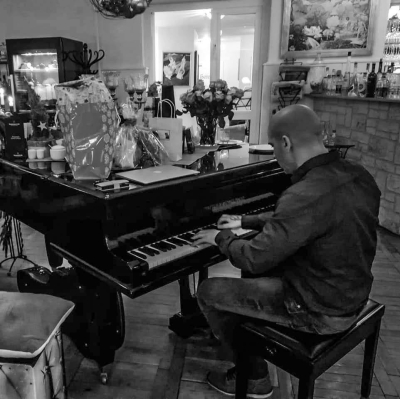
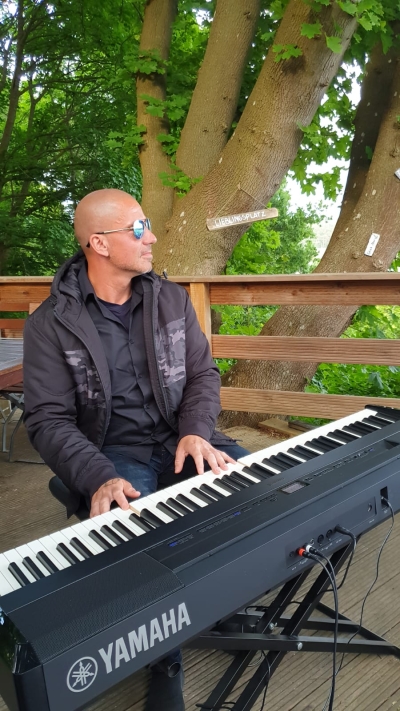
KP: When did you start getting interested in music?
ZP: I was 10 years old when I saw a synthesizer for the first time during one of the holidays. It was instant love! In the same year, I received my first keyboard from my mother and stepfather.
KP: Did you take piano lessons or are you self-taught?
ZP: I was completely self-taught until I was 12 years old. Then, fortunately, my family noticed my talent and strong interest in music. That same year, a new music school (László Planky) started in the city. They offered synthesizer/keyboard training, so my family enrolled me. I developed so rapidly that they soon noticed that I far exceeded the other students with my knowledge and talent. We had public exams before the end of the year where we played for an audience, and I always asked my current instructor to teach me a difficult song that would impress the audience. I was thirsty for success and recognition. I was very nervous at every exam and had terrible stage-fright, but I managed to achieve the desired effect and always received the biggest applause from the audience as well as recognition from the teachers and examiners. This was a huge motivation to continue playing music and studying. I went to that school for four years, and then I transferred to another music school, also majoring in keyboards. I was 17 at the time. I was supposed to go for three years, but when the end-of-the-year exam came, a very interesting and surprising thing happened. For the exam, two compulsory songs and one freely-chosen song were required. The practical part of the exam took place in front of a public audience. I played the first two compulsory songs, but the freely-chosen piece was my own composition. The three examining teachers were very surprised and really liked my performance. Immediately after the exam, they called me back into the exam room and told me that I was simply overqualified for this music school and that it was unnecessary for me to continue going there because they couldn't teach me anything else. They said I should be in a music conservatory. Essentially, I took a composite exam for all three years in the first year.
When I was 28 years old, I became very interested in the bar piano genre, so I started teaching myself to play the piano. I never went to a piano teacher or studied composition. I listened to a lot of piano music and watched a lot of videos and I managed to improve my knowledge and my skills to the level they are now.
Sometimes there are methods that are much more effective than a piano lesson. I'll never forget when I was maybe 12 years-old. I listened to Richard Claydermann a lot and wanted to learn "Ballada Pour Adaline." That was the first time I tried to learn a piano piece. Unfortunately, I had problems separating my left and right hands from each other. My brother sent me into our little room, locked the door and wouldn't let me out until I mastered this skill. That method might sound too strict, but it was actually very effective, because, if I remember correctly, I learned the piece in about 1 hour - mainly to get out of my temporary prison. Maybe my brother would be a good tutor? In any case, this may be an effective method that some piano teachers should use. But Gábor also supported me in other ways when it came to making music. He bought me my first keyboard, which had a nicer sound, making it more enjoyable for me to play as well as for those who listened.
KP: As a longtime piano teacher, I really can't recommend your brother's method, but I'm glad it worked for you!
When did you compose your first piece of music?
ZP: At around the age of 13, I made up simple melodies, but I was 16 when I started making my own music with a synthesizer. It was electronic music. Mainly under the great influence of artists Jean Michel Jarre, Laser Dance and Koto, which I listened to a lot at the time. In 1999, at the age of 17, I performed live a few times with these songs. In 2017, I composed my very first solo piano piece.
KP: When did you start playing with a band?
ZP: In 1999, a talent search competition was organized. I applied and performed my own electronic music. The frontman for a band called FREE DANCE - Gábor Dolovai - was present at this competition as a guest performer. He really liked what I was doing. After my performance, he came to me and said that he was looking for a keyboard player for the band. FREE DANCE was already known by many people in the city, so I considered this a very good opportunity. I joined the group as the keyboardist and composer. A few days later, we were already in the studio working on new songs.
KP: It sounds like the band was quite successful. Tell us about that.
ZP: When I joined FREE DANCE, there was a kind of concept change and an update regarding the band members and the music as well. I wrote completely new music. A little later, a new singer and two dancers joined the band and the team expanded to 5 members. Then the B&B Production office embraced us and organized a lot of concerts for us. We played concerts almost every weekend for 4 years and soon gained national recognition. As a result, we had even more performances. At one point, we did three concerts on the same evening in three completely different places! In 2001, our CD was released and we had several radio and television appearances. I was also working 3-4 days a week in a restaurant delivering pizza. Quite often, when I delivered a pizza, the people recognized me from the band and even told me so. Maybe they saw me on stage on the weekend like a star and the next day I'm delivering pizza to their house. This is quite an illusion destroyer! So, FREE DANCE was really a very successful team, but I somehow felt the whole time that I wasn't getting enough attention and I couldn't fully fulfill myself professionally and musically. My task in the band was mostly focused on studio work. The weekend concerts were mostly just part of the entertainment, and I was always in the background onstage. The singers and dancing girls obviously received the most attention. At concerts, we often played our songs from CDs. The keyboard and I were mostly just decorative elements of the show. Because of this, I got into arguments several times with the band's frontman and singer. In 2004, our contract with the B&B Production office expired, and for other reasons the band broke up for good.
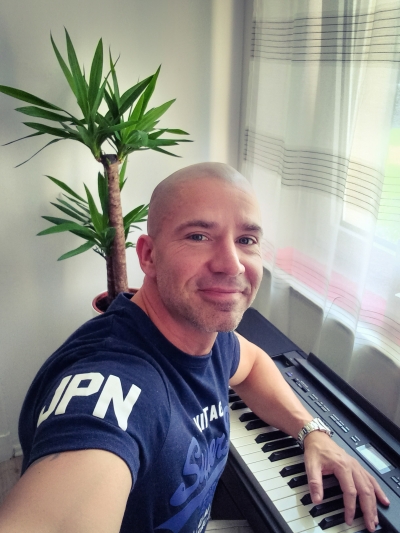
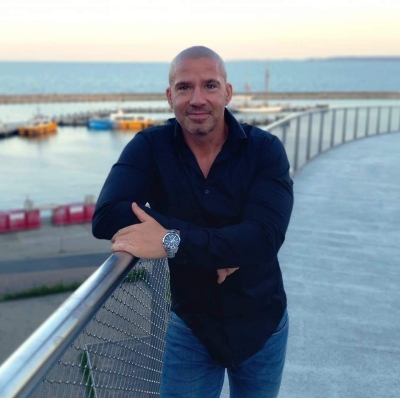
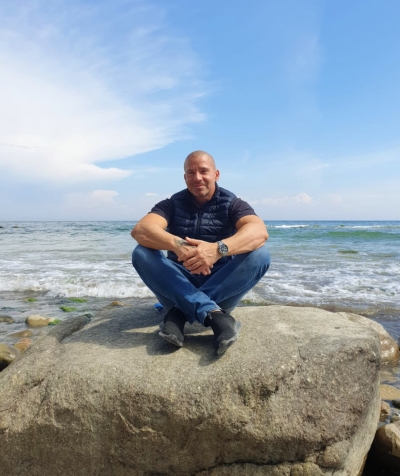
KP: You also wrote music for other artists for awhile. Was that mostly pop music and vocal music rather than instrumentals?
ZP: In 2008, I furnished one of the three rooms in my apartment as a small music and recording studio. Mainly, I made musical bases for rap artists. I have played simpler piano parts into some musical bases, but I also recorded rap lyrics and vocals. I also wrote music for celebrities appearing in TV shows and reality shows. In the meantime, I was working on my own solo electronic music projects in this small home studio.
I really like rallying and have been to a lot of races as a spectator, but one time I took part in a rally where I got the first place in my category. So I wrote a song for rally fans in 2009 for that reason. I wrote the lyrics and music for this song, and I also rapped and sang it. This song became nationally known and became a kind of "Rally anthem" within rally circles in Hungary.
KP: You have mentioned that you played the piano for large audiences in a coffee house. Where was that and how long did you play there?
ZP: I am happy about this question, because I mentioned earlier in the interview that we would return to the work related to the theater later. Before I tell you how I became the bar pianist of the Vörösmarty Theatre's café, I must mention that in 2007 I started working full-time as a security guard at this Theatre, but I started playing the piano there in 2012. This is another strange and interesting story. One evening when I was off work and resting at home, one of the performances had its premiere in the theater. After the performance, there was an event in the theater's café where a pianist was invited to play, but there was some misunderstanding. When the musician arrived, it turned out that he was not a pianist but a keyboardist, so he canceled the performance. The organizers had about an hour to find another pianist. You can imagine that this is not an easy task at around 8-9 pm! At the Theater, they knew that I had a musical background and that I could play the piano to some extent, because they heard me a few times when I was testing the piano in the cafeteria during my shift. They called me from the theater and told me what happened and asked me, almost begged me, to save them from this embarrassing situation and play the piano at this event. They said I had about 15 minutes to get to the Theater. I was very surprised and at first I firmly said "no." During this period, I was still "only" a keyboardist and not a pianist. I had never performed anywhere as a pianist. It's one thing when I practice alone on the piano and completely different when I have to play in front of an audience of hundreds of people, let alone at one of the theater's official events. Unfortunately, the organizers had no other option in this situation, and I was their last hope. So they definitely kept trying to persuade me on the phone to accept the gig, which was about 1 hour, and they offered me a lot of money in return. Although every cell in my heart wanted me to say "no," I also knew that this would be a very good opportunity, so I finally said "yes." I had about 15 minutes to get there, but luckily I only lived 3 minutes from the theater. I mustered up all my courage and set off. The event took place and everything was fine. I impressed the operator of the café so much with my piano playing that a few days later he came to me and asked if I would like to play the piano regularly 2-3 times a week in the café. I immediately said "yes!" but I was also aware that I still had a lot to practice and improve. Fortunately, I had a few weeks to properly prepare for my first performance. So, from that day on, I practiced 4-5 hours a day on my keyboard at home, because I didn't have a digital piano at that time. And that's how I became the bar pianist of the café of the Vörösmarty Theater and played there 2-3 times a week in front of an audience of hundreds of people until 2013. This story proves in part that we are capable of much more than we imagine ourselves to be. On the other hand, it proves that the "talent component" is not always sufficient for success. It requires several components: the right circumstances, good timing, luck, knowing competent people, etc. Think about it: if I wasn't at home or had other things to do when they called me from the theater, everything might have turned out completely differently.
KP: It's amazing how things fall into place sometimes! You have said you moved away from music for awhile. What happened?
ZP: That's right! There were several reasons for this. In 2011, when I was 29 years old, I lost my mother. I had a very good relationship with her and after that, I felt that somehow I couldn't find my place in the world. I had a very hard time processing my mother's death. I think a person really becomes an adult when they lose their parents. At least it was like that for me. I received a lot of support from my mother - both in love and financially - so after she died, I really experienced what it's like to stand on your own two feet without help and support. I had lived in Hungary my whole life in this city, Székesfehérvár, and I really felt that I needed a change of scenery. In addition, I had wanted to learn a foreign language for a long time. I was constantly struggling with financial problems, and my girlfriend at the time, who was a waitress in the theater, often told me I should go abroad. All the signs indicated that I should leave Hungary. It was a very difficult decision to make when my career as a pianist had just begun and I liked working as a security guard at the Theater. On the other hand, I was also aware that I had to try my luck abroad for an easier, better quality of life and for my spiritual healing. Austria is located next to Hungary and earnings are much higher than in Hungary, so it seemed the most obvious choice. We both quit our jobs at the theater and set off for Austria with a car borrowed from my stepfather and only 70,000 forints - about $200 when converted. I think everyone can imagine how many sacrifices and difficulties it entails to leave one's own country and move abroad - at least initially. Since I didn't know the German language, at first I could only do pretty bad jobs and I didn't have any musical instruments at home, so I didn't even have the opportunity to practice. After a year passed, things started to improve financially, and in 2015, I was able to buy my first digital piano. I was very happy to be able to play music again!
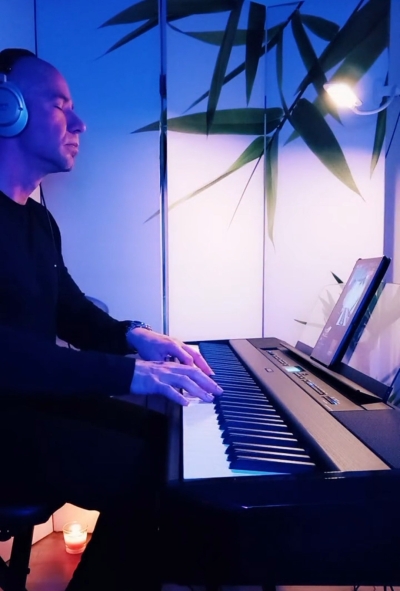
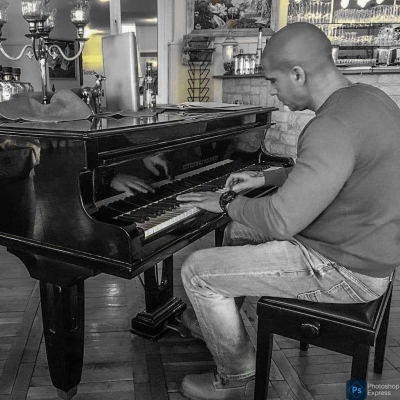
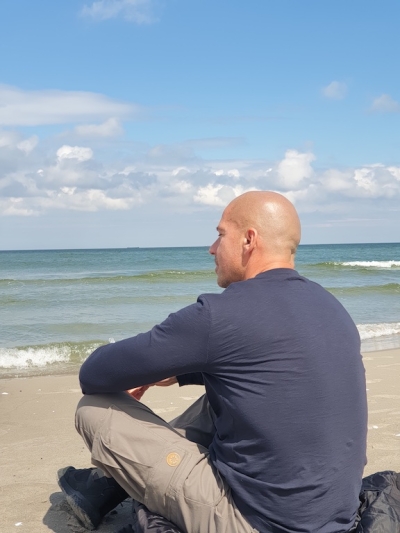
KP: I can imagine! Do you play other musical instruments beside piano and keyboards?
ZP: No, but guitar and drums have always interested me. I tried to play the guitar once, but it didn't work at all. My fingers seem to be keyboard-only compatible.
KP: [laughs] Who and what do you consider to be some of the biggest influences on your music?
ZP: Losing my mother. The Piano Haven concerts. The beautiful island where I live. Love and mental anguish. Anxieties. The Covid 19 period. I think you can hear and feel all of them in my music. Each of my piano pieces can be linked to some specific stage of my life and some deep emotional state, whether positive or negative. I tried to compose by just sitting down at the piano, but I never managed to create anything that way.
KP: Interesting! Who are some of your favorite composers and performers?
ZP: Among the classical composers, Chopin is definitely my favorite. When I started playing the piano, Ludovico Einaudi was my favorite, but to be honest, once I discovered Piano Haven and Whisperings Radio and heard the featured artists play the piano, I've come to realize that Einaudi is a bit overrated. I think there are several pianists among the Whisperings artists who deserve the same level of attention and world fame as the composer of the "Intouchables" soundtrack because they are all great composing pianists. Some of my favorites are: Joe Bongiorno, Michael Martinez, Christine Brown, David Nevue, Thad Fiscella, Dan Chadburn. Their music helped me a lot when I was at a very low point mentally, but I'm happy to listen to them play anytime. If I had to single out one name, it would be Joe Bongiorno. Somehow, his musical world and playing are the closest to mine. Nothing proves this more than the fact that I have already learned about 20 of Joe's pieces and play them often.
KP: That's great! What has been your most exciting musical experience so far?
ZP: Most recently, it was when I first heard my music on Whisperings Solo Piano Radio. It was incredible! Even now I get goosebumps just talking about it. I also have an older, very defining and memorable musical experience, which happened back in 2013 when I played the piano at the Theater. One of the actors had a private birthday party organized for him where several actors known from television and movies as well as well-known musicians were guests. There were about 40 people and it was held in the theater's cafeteria. A few days before, one of the actresses came to me with the idea of me playing the piano at this birthday party while they celebrated and had dinner. Of course I said "yes"! I was very nervous, but when I played the piano for them, several actors came up to me to congratulate me. They really liked the atmosphere I created with my piano playing. One of them called me aside and told me that he had already met and worked with many pianists during his acting career, but there was something special in my playing that he hadn't heard from anyone else and he asked me to continue this in the future because it is my style - he was sure of it! That experience left an eternal mark on me and I will never forget it! Actually, every occasion is an exciting musical experience for me, especially when I listen to the final version of a new piano piece and know that soon this music will be heard by someone on the other side of the world...
KP: If you could have any three wishes, what would they be?
ZP: The first wish is not surprising. I would like to finally become a full-time musician and composer.
My second wish is to visit Joe Bongiorno in Sedona to record one of my albums at Piano Haven studio and play a concert with Joe.
My third wish is that I, my family members and those I love and care about can live long, healthy lives and not suffer from any disease.
KP: What's up next for you?
ZP: That's a difficult question. I plan to release some of my previously-composed pieces as singles next year. My main goal is still to reach the level where I can become a full-time pianist and to make my music known to as many people as possible in the world.
KP: Is there anything else you'd like to talk about?
ZP: I want to thank you, Kathy for making this interview possible! I really enjoyed it. I hope you and the readers do, too. I am very grateful!
Many thanks to Zsolt Pataki for taking the time to do this interview! Be sure to visit his
Artist Page here on MainlyPiano.com, listen to his music, and watch his videos on YouTube.
Kathy Parsons
October 2024

